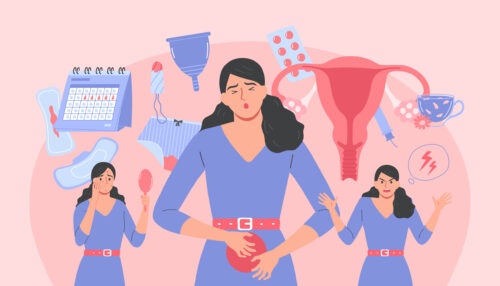September marks PCOS Awareness Month, a crucial time to shed light on Polycystic Ovary Syndrome (PCOS), a hormonal disorder that affects an estimated 1 in 10 women of reproductive age.[1] Despite its prevalence, PCOS often goes undiagnosed, misunderstood, or minimized, making awareness efforts more important than ever.
What is PCOS?
PCOS is a complex hormonal condition that impacts how a woman’s ovaries function.
The health condition is primarily characterized by:
- Irregular menstrual cycles
- Elevated levels of androgens (male hormones)
- Polycystic ovaries detectable through ultrasound
However, PCOS goes beyond reproductive health and can significantly affect metabolism, emotional wellbeing, and long-term health risks such as type 2 diabetes, heart disease, and infertility. “PCOS affects more than reproductive health—it impacts the entire body, making a thorough and comprehensive approach to diagnosis and treatment essential,” says Gillian Boyd-Woschinko, M.D., a board-certified endocrinologist by the American Board of Internal Medicine, at Mountainside Medical Center.
Symptoms of PCOS
PCOS can present differently from person to person, but common symptoms include:
- Irregular or missed periods
- Excess facial or body hair
- Severe acne or oily skin
- Weight gain or difficulty losing weight
- Thinning hair or hair loss on the scalp
- Mood changes, including anxiety or depression
- Difficulty getting pregnant
Because symptoms vary and can overlap with other conditions, many individuals may not recognize them as signs of PCOS. “Persistent symptoms such as irregular periods or unwanted hair growth shouldn’t be overlooked. With proper care, women with PCOS can maintain their health and thrive.” adds Dr. Boyd-Woschinko.
Treatment Options
While there is no cure for PCOS, symptoms can be effectively managed with a tailored treatment plan.
Approaches may include:
- Lifestyle changes: A balanced diet and regular exercise can help regulate menstrual cycles and improve insulin sensitivity.
- Hormonal birth control: Oral contraceptives are commonly prescribed to regulate periods and reduce androgen levels.
- Anti-androgen medications: These can help with acne and excessive hair growth.
- Fertility treatments: If conception is a goal, options like ovulation-inducing medications or assisted reproductive technologies may be considered.
- Insulin-sensitizing drugs: Metformin is often used to address insulin resistance, a common issue in PCOS patients.[2]
Who Should You See?
If you suspect you have PCOS, start by scheduling an appointment with an endocrinologist. They can evaluate your symptoms, order necessary blood tests, and help manage symptoms if needed.
To schedule an appointment with an endocrinologist, please click here or call 973-798-4777.
[1] Polycystic Ovary Syndrome (PCOS): Symptoms, Causes, Tests, and Treatment

